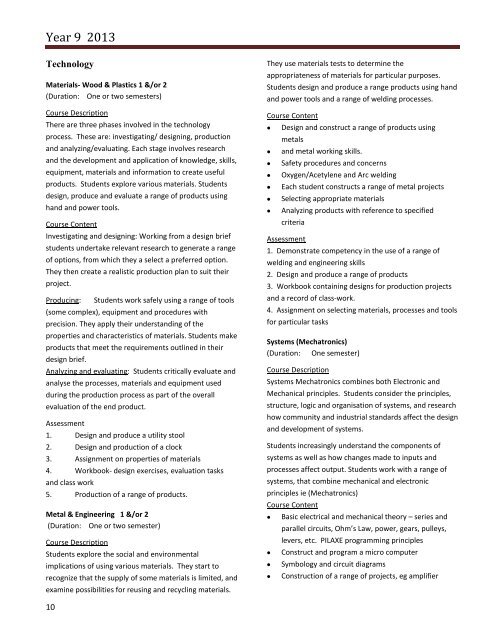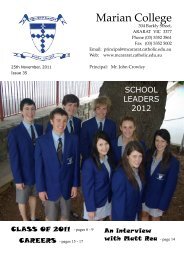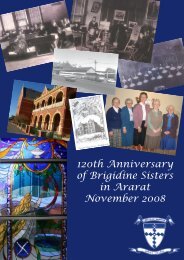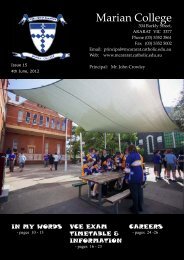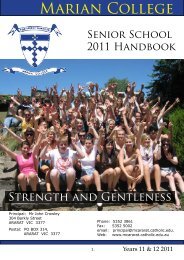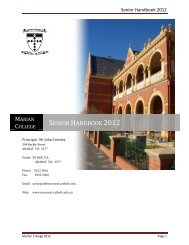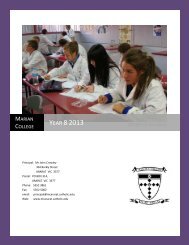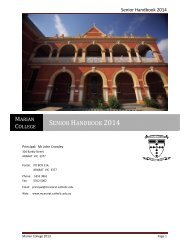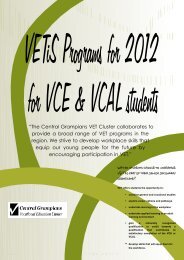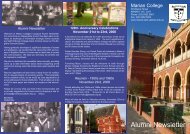Year 9 2013 - Marian College
Year 9 2013 - Marian College
Year 9 2013 - Marian College
Create successful ePaper yourself
Turn your PDF publications into a flip-book with our unique Google optimized e-Paper software.
<strong>Year</strong> 9 <strong>2013</strong><br />
Technology<br />
Materials- Wood & Plastics 1 &/or 2<br />
(Duration: One or two semesters)<br />
Course Description<br />
There are three phases involved in the technology<br />
process. These are: investigating/ designing, production<br />
and analyzing/evaluating. Each stage involves research<br />
and the development and application of knowledge, skills,<br />
equipment, materials and information to create useful<br />
products. Students explore various materials. Students<br />
design, produce and evaluate a range of products using<br />
hand and power tools.<br />
Course Content<br />
Investigating and designing: Working from a design brief<br />
students undertake relevant research to generate a range<br />
of options, from which they a select a preferred option.<br />
They then create a realistic production plan to suit their<br />
project.<br />
Producing: Students work safely using a range of tools<br />
(some complex), equipment and procedures with<br />
precision. They apply their understanding of the<br />
properties and characteristics of materials. Students make<br />
products that meet the requirements outlined in their<br />
design brief.<br />
Analyzing and evaluating: Students critically evaluate and<br />
analyse the processes, materials and equipment used<br />
during the production process as part of the overall<br />
evaluation of the end product.<br />
Assessment<br />
1. Design and produce a utility stool<br />
2. Design and production of a clock<br />
3. Assignment on properties of materials<br />
4. Workbook- design exercises, evaluation tasks<br />
and class work<br />
5. Production of a range of products.<br />
Metal & Engineering 1 &/or 2<br />
(Duration: One or two semester)<br />
Course Description<br />
Students explore the social and environmental<br />
implications of using various materials. They start to<br />
recognize that the supply of some materials is limited, and<br />
examine possibilities for reusing and recycling materials.<br />
They use materials tests to determine the<br />
appropriateness of materials for particular purposes.<br />
Students design and produce a range products using hand<br />
and power tools and a range of welding processes.<br />
Course Content<br />
• Design and construct a range of products using<br />
metals<br />
• and metal working skills.<br />
• Safety procedures and concerns<br />
• Oxygen/Acetylene and Arc welding<br />
• Each student constructs a range of metal projects<br />
• Selecting appropriate materials<br />
• Analyzing products with reference to specified<br />
criteria<br />
Assessment<br />
1. Demonstrate competency in the use of a range of<br />
welding and engineering skills<br />
2. Design and produce a range of products<br />
3. Workbook containing designs for production projects<br />
and a record of class-work.<br />
4. Assignment on selecting materials, processes and tools<br />
for particular tasks<br />
Systems (Mechatronics)<br />
(Duration: One semester)<br />
Course Description<br />
Systems Mechatronics combines both Electronic and<br />
Mechanical principles. Students consider the principles,<br />
structure, logic and organisation of systems, and research<br />
how community and industrial standards affect the design<br />
and development of systems.<br />
Students increasingly understand the components of<br />
systems as well as how changes made to inputs and<br />
processes affect output. Students work with a range of<br />
systems, that combine mechanical and electronic<br />
principles ie (Mechatronics)<br />
Course Content<br />
• Basic electrical and mechanical theory – series and<br />
parallel circuits, Ohm’s Law, power, gears, pulleys,<br />
levers, etc. PILAXE programming principles<br />
• Construct and program a micro computer<br />
• Symbology and circuit diagrams<br />
• Construction of a range of projects, eg amplifier<br />
10


